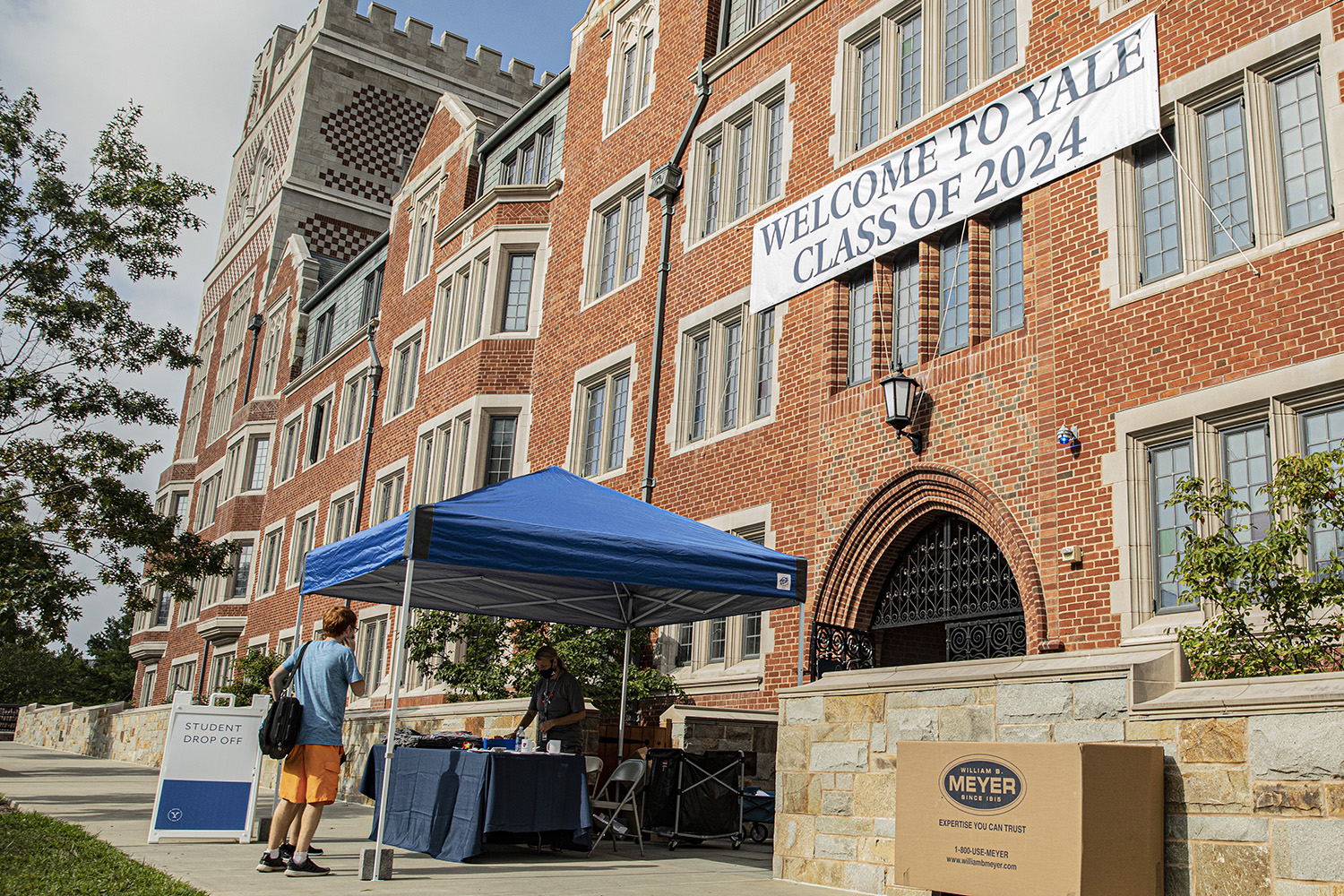‘Wandering’ and ‘vulnerable’: Sophomores weigh in on first on-campus experiences
As they begin a semester of in-person learning at full capacity for the first time, some sophomores said the University has not given them enough support.

Yale News
It was summer when Lauren LeClaire ’24 first visited Yale — not as a prospective applicant or recent admit, but as a rising sophomore.
LeClaire spent the entirety of her first year at Yale in her childhood bedroom on Zoom, a situation not unheard of among members of her class. The majority of the class of 2024 spent half or all of last year away from campus, with the COVID-19 pandemic precluding an in-person introduction to Yale. This fall, sophomores are returning to Yale for the first time in many months, or, like LeClaire, arriving for the first time ever, and the in-person college experience is new to them all. But some say the University has not done enough to help students adjust.
“I feel like we’re in such a weird, vulnerable position,” LeClaire said. “Like [first years] obviously get their support, and the upperclassmen got it down, and we’re all just wandering around.”
This fall, the sophomore experience has proven particularly atypical from the start. While first year move-in took place Aug. 27, and many older students had the flexibility of off-campus housing, sophomores could not move in until Aug. 30, two days before the start of classes. In the fall of 2019, by contrast, upperclassmen residences opened two days before first year move-in and a full week before classes.
The abbreviated move-in timeline made the initial transition to campus life more challenging for sophomores, according to Sophomore College Council President Leleda Beraki ’24. She said many students were “scrambling” to unpack and adjust.
“The turnaround was definitely not good for our stress levels or our sleep schedules,” Beraki said.
LeClaire said she wished the University had let sophomores move in earlier and provided optional orientation programming. She spent this past summer on campus enrolled in Yale Summer Session courses as a “test run” for the fall, giving her the chance to get to know New Haven and make friends. Without that few months’ head start, she said, she would have been “out-of-my-mind confused, like terrified.”
Beraki concurred that a sophomore orientation could have helped students meet peers outside of their residential colleges and learn about “resources and spaces” available to them.
In an email to the News, Dean of Student Affairs Melanie Boyd highlighted efforts the University has made to help the class of 2024 bond this fall, such as the Aug. 30 class dinners in the residential colleges and the sophomore trip to Quassy Amusement Park in Middlebury, Connecticut. These events were intended to help foster in-person connections and establish the “character and identity” of the class, Boyd added.
Students should turn to their advisers for “continuity and support,” Boyd said, as well as deans and heads of colleges. Boyd also pointed to the community wellness specialists in the new Yale College Community Care program — a mental health program where staff are affiliated with specific residential colleges — as a resource.
While Sofiya Bidochko ’24 told the News that she appreciates the administration’s efforts to help her class bond, she wishes the school would “put more time into everyday resources.” An optional sophomore mentorship program — either in small groups, FroCo-style or in individual pairings with upperclassmen — could be hugely beneficial to students, she said, particularly those struggling to connect with their older peers.
“I don’t have a FroCo anymore, so I can’t ask her [questions] … if you don’t know that many people at Yale and you don’t know many upperclassmen, which you probably don’t because everything was remote [last year] and people had so much trouble making friends, then you wouldn’t know who to ask,” Bidochko said.
First-year counselor Deon Ababio ’22 acknowledged that many experiences this year’s sophomores are facing mirror those of the first years he is currently advising. He feels that students originally in the class of 2024 who took one semester off last year are now considered second-semester first years but are not receiving the same support as the class of 2025, he added.
“I expect that all students, regardless of class year, are facing challenges as they start the semester during the pandemic, which of course has affected everyone,” Boyd wrote.
Beraki pointed out that the rigor of in-person work alongside new social commitments is also proving challenging to sophomores who are experiencing both simultaneously for the first time. She has been struggling to find balance because “life is not just hopping on a Zoom call anymore,” she said.
Beraki emphasized that sophomores are in “dire need” of transitional resources, and LeClaire echoed her sentiment.
“I feel like there are sophomores that are kind of alone in the world right now,” LeClaire said. “They go to their room, they go to meals and they go back. I feel like people still need the help. … I feel like a lot of people are pretending they have it down.”
As of February, there were 1,759 members of the class of 2024, including the 568 members of the original class of 2023 who took semesters off.







